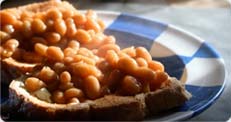
I was the odd one out. Actually, I was part of the odd two out. I didn’t like it at the time but looking back, it was one of the best things that could have happened to me.
You see, when I chose what subjects to study at secondary school (the UK version of high school), I wanted to pick CDT. This stood for Craft, Design & Technology and it covered things like woodwork, graphic design, etc. The thing is, they couldn’t fit it in the timetable based on all the other subjects I was studying. The only choice I had was Food Technology – AKA Home Economics.
This wasn’t a subject that guys chose, proven by the fact that I was one of only two guys in a class of 20-30. Whenever I mentioned to friends that I had Food Tech next, I’d always qualify it by saying “I had to do it – they couldn’t fit CDT in the schedule”. I’ll admit – I was embarrassed at having to study a “girlie” subject.
Looking back, this is a little weird. I was never a macho guy and enjoyed helping my Mum bake stuff when I was younger. My friends also weren’t the kind of people to do a Nelson. This didn’t stop me from wanting to make sure everyone knew it wasn’t my choice though. It also seemed like Food Technology wasn’t a subject that was worth studying or one that would be fun.
How wrong I was.
Looking back at everything I learned at school, I think I’ve probably needed to know – and have used – every single thing I learned in Food Tech. It therefore makes me wonder why this isn’t mandatory learning in all schools, especially given the obesity problem worldwide.
I moved out of home when I was 17, but thanks to the knowledge gained in Food Tech I knew how to prepare meals.
I knew which foods to eat regularly and which to have in moderation.
I knew about food hygiene.
I knew you put uncooked meat on the bottom shelf of the fridge.
I knew you used different chopping boards when cutting up meat, fish and vegetables.
And I knew nutritional information, like baked beans on toast being a good source of HBV (High Biological Value) protein.
At this point, every American reading this (like my wife!) is saying “Baked beans on toast? What?!” It’s a British delicacy and trust me – it’s delicious. Baked beans have Low Biological Value protein and toast has LBV protein as well, but put them together and voila – you have High Biological Value Protein.
My point here is that without studying food tech, I’d have thought beans on toast had no great nutritional value, whereas it’s actually a really healthy, quick and easy-to-make meal. I wouldn’t have known what kinds of vitamins are in what types of food. And I wouldn’t have learned how to prepare meals so that even when cooking 5 or 6 different things at the same time, they finish cooking at the same time so I can serve them all hot together.
These are skills and knowledge that most students today simply don’t have, even though they’re precisely the kind of life lessons schools should be preparing youth for. I love maths and found simultaneous equations simple. There’s not a single time in my 31 years of life though where I’ve needed to know how to work out what x and y are, if both 3x + 7y and 5x – 16y equal 83.
The global economy is changing and the jobs market for youth is different now than when I left school. I’m sure it’ll have changed drastically again in 20 years time. No matter what job skills youth will need in the future though, there’s one thing I can guarantee they’ll need to do – eat. And eat healthily.
So as youth workers, let’s do our part by teaching youth the importance of knowing how to cook and food nutrition – it could literally save their life.
(n.b. x = 23 and y = 2 in case you’re wondering. Which, unless you’re geeky like me, you probably aren’t.)
Question: What other subjects do you think should be made obligatory in schools? Let us know in the comments below.
You can also connect with us by:
- Signing up to receive our posts via email
- Following us on Twitter
- Liking us on Facebook
- Signing up to our RSS feed